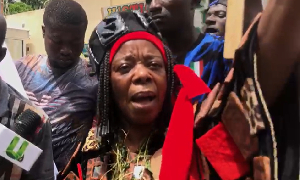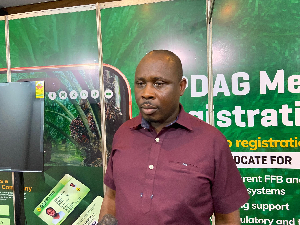By Kwame Okoampa-Ahoofe, Jr., Ph.D.
In his book JFK: Ordeal in Africa (New York: Oxford UP, 1983), the author helps the reader to also begin to remarkably appreciate a bit of what might have prompted Mahoney to characterize Nkrumah as “a troubled personality.” While he had, in fact, produced several children by Ghanaian women both before his landmark departure for advanced studies in the United States as well as after his return to his motherland in December 1947, we find Nkrumah rather mischievously, frivolously and vainly quibbling about why, somehow, no individual Ghanaian woman met his conjugal standards. On this score, this is what the author of JFK: Ordeal in Africa has to say: “In the heady days after independence, he had laughingly said that he would never marry a Ghanaian woman because ‘all of Ghana is my bride.’ He had eventually married an Egyptian woman (on whom he had never set eyes before her arrival in Ghana) in order to fulfill a prophecy that the son of a black African man and a white African woman would rule all of Africa. For Nkrumah, liberation was only the first step. The next was the unification of the entire continent” (158).
In other words, what Mahoney is clearly implying here, wittingly or unwittingly, is that Nkrumah suffered from an acute case of what I have personally termed as THE DACOSTA COMPLEX, a bizarre form of conjugal neurosis verging on clinical self-alienation deftly and politically cast in terms of continental African integration. In the case of Nkrumah’s daughter by his Egyptian wife, Samia Yaba Nkrumah, who has been widely reported to be fervidly gunning for the Ghanaian presidency come 2016, the conjugal malady may well be aptly cast in terms of a HANNIBALIAN COMPLEX or even the SICILIAN COMPLEX, where Africa’s historic racial admixture with the Greco-Roman denizens on the Italo-Iberian peninsula becomes metaphorically sublimated and strategically projected onto the Ghanaian votive/victim on the altar of cosmopolitan pan-Africanism, epically cast in terms of pan-African globalism.
Is there any wonder, therefore, that Ghanaian womanhood was crassly undervalued throughout the 15-year tenure of the Nkrumah-led Convention People’s Party? According to T. Peter Omari (See Kwame Nkrumah: Anatomy of an African Dictatorship), the proverbial African Show Boy was known to rascally counsel his CPP male disciples to “take good care of the Ghanaian woman,” in the abjectly vulgar sense of the term. No wonder that not many Ghanaian women scholars and avid students of CPP political culture have had a lot that is complimentary to say about the treatment of women, besides the expedient and public use of a handful of them to great propagandistic effect (See Kwame Arhin’s The Life and Work of Kwame Nkrumah).
For Mahoney, as also for other avid students of postcolonial Ghanaian culture, Nkrumah may well have conveniently orchestrated his own political debacle. Or, perhaps, it had something “Caesarean” about it, in Shakespearean parlance: “Later, when there were attempts on his life, Nkrumah saw the hand of the West at work. Vowing not to become another Lumumba, he sought refuge – and vindication of his pan-Africanist dream – in the East. The Russians gave him what he wanted – the Lenin Peace Prize and military advisors to train his praetorian guard – but no amount of attention from the Kremlin could restore his lost standing at home. The week before his departure for China in February 1966, there were reports of military plots. His aides urged him not to leave the country, but Nkrumah brushed aside their warnings. Perhaps he felt, as Basil Davidson later wrote, ‘an inner hopelessness’ about it all” (Mahoney 158).
The author of JFK: Ordeal in Africa also depicts Nkrumah’s relationship with the United States as the leader of newly independent Ghana in terms of exuberant and abjectly naïve desire to please his Washington supreme overlords, even while at home he pathetically pretended to be an intransigent bulwark against Western imperialism. There was, of course, no doubt that the Ghanaian premier harbored an apishly megalomaniacal desire to playing Big Brother in the Third World. On Nkrumah’s 1958 official visit to the United States, for example, Mahoney writes: “As Africa’s emissary, Nkrumah said everything he could to allay Eisenhower administration anxiety over the radical course of events in North Africa and the Middle East. Time [magazine] wrote, ‘Seldom was a guest from a small country more welcome. The State Department saw the nationalism of his year-old country and the promise of his African leadership as a possible future counterbalance to rampant nationalism spreading from the Mideast.’ Nkrumah even proposed the creation of a United Nations force led by three Ghanaian battalions to replace American marines in Lebanon” (JFK: Ordeal in Africa 161).
Nkrumah would also vigorously defend the at once lurid and abominable culture of Jim Crowism, or racial segregation, as a highly exaggerated social blight, or a minor blemish of human nature, capriciously and unfairly harped upon by rabid detractors of the United States to embarrass the latter. On this score, a palpably horrified Mahoney opines: “He [i.e. Nkrumah] cast himself as the West’s best friend in Africa, scolding Nasser for his irresponsible declarations and stating on [the American television talking-heads program] Meet The Press that, ‘We in Ghana have no fear of communism.’ The Preventive Detention Act, he said, was only ‘temporary.’ As for the spectacle of segregated America, ‘the racial question has often been exaggerated by those wishing to bring [the name and dignity] of the United States into disrepute.’”
A firebrand and a vanguard freedom fighter, indeed! Mahoney himself seems to be taken aback by Nkrumah’s patent display of abject insincerity, almost verging on downright cowardice, in the preceding quote. On this score, the author of JFK: Ordeal in Africa bitterly laments: “Anyone in the American government who had read Nkrumah’s memoirs [i.e. Ghana: The Autobiography of Kwame Nkrumah] published the previous year, would have had reason to question the sincerity of these remarks. During his ten years as a student in the U.S. during the Great Depression, Nkrumah had lived the wretched life of the American Negro. He had felt the sting of racial humiliation. His 1958 motorcade through Harlem may indeed have been ‘triumphal.’ It may even have awakened the ‘somnolent imagination of the American Negro,’ as one reporter put it. But it was difficult to say which American memory lay deeper in Nkrumah’s mind: that of the Ghanaian Prime Minister standing in the back of a Cadillac waving to the screaming Harlem crowds, or that of the shivering ‘Negro’ of fifteen years before standing on the corner of 125th Street in the dead of winter hawking fish” (161-2).
Mahoney seems to have a brilliant riposte for this insufferably grotesque display of Uncle Tom-like deference, on the part of the Ghanaian premier, to the gaping and running sore of America’s rabidly anti-African racism. And such fetid deference, Mahoney tells his readers, had a dollar sign boldly written all over it: “The prize that he hoped to win by his deference to [white-] American sensibilities was U.S. financing of the Volta project – a $600 million enterprise that had been discussed for nearly fifty years. Nkrumah fervently believed in electrification as the essential prerequisite to industrial growth. He had admonished his Western readers in a Foreign Affairs [journal] article, ‘We have to modernize. Either we shall do so with interest and support of the West or we shall be compelled to turn elsewhere….’ Senator Kennedy, who was then engaged in a major effort to sell the Senate on a long-term aid package for India, was one who took note of Nkrumah’s appeal” (JFK: Ordeal in Africa 162).
*Kwame Okoampa-Ahoofe, Jr., Ph.D., is Associate Professor of English, Journalism and Creative Writing at Nassau Community College of the State University of New York, Garden City. He is Director of The Sintim-Aboagye Center for Politics and Culture and author of “Sounds of Sirens: Essays in African Politics and Culture” (iUniverse.com, 2004). E-mail: okoampaahoofe@optimum.net.
###
Opinions of Tuesday, 17 January 2012
Columnist: Okoampa-Ahoofe, Kwame














